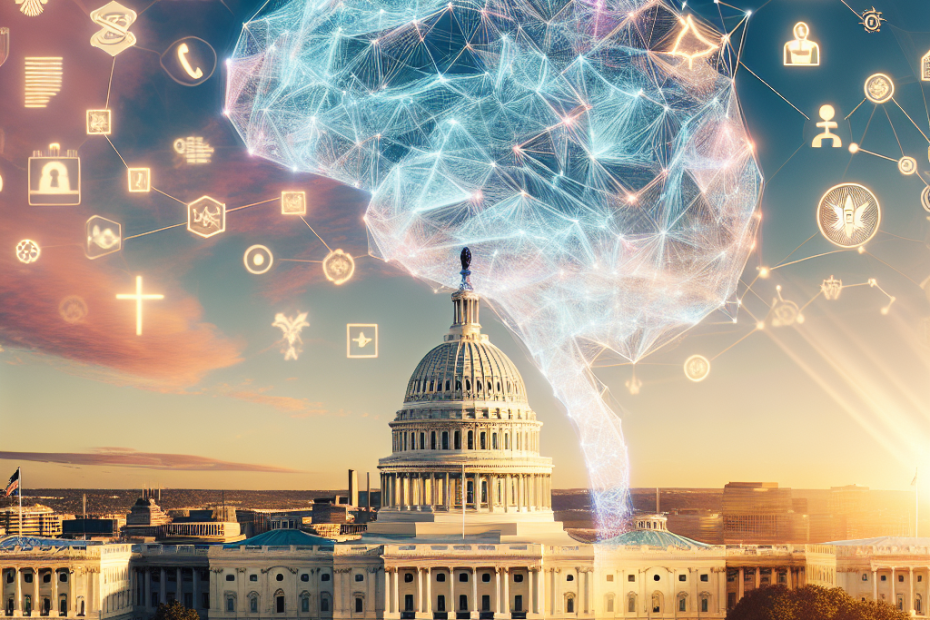Innovating with AI in Federal IT Projects
In today’s fast-paced technological landscape, artificial intelligence (AI) stands out as a revolutionary force transforming industries globally. Particularly in federal IT projects, AI innovation is driving significant advancements. By integrating AI into government operations, federal agencies are enhancing efficiency, improving service delivery, and bolstering decision-making capabilities. This blog post explores the multifaceted role of AI in federal projects, discussing its impact, challenges, and future potential.
Introduction
Artificial Intelligence has become a cornerstone of modern technological solutions, driving innovation across industries worldwide. For federal IT projects, AI presents an opportunity to revolutionize how government entities operate. From streamlining processes to enhancing cybersecurity measures, the integration of AI is pivotal in addressing complex national challenges while ensuring transparency and accountability. As we delve into the innovative applications of AI within federal projects, a landscape ripe with possibilities emerges, poised for transformative change.
The Role of AI in Federal IT Projects
Enhancing Efficiency and Productivity
At the heart of AI innovation in federal IT projects is the drive to improve efficiency and productivity. By automating routine tasks, AI systems can process data at an unprecedented scale and speed, freeing up human resources for more complex issues. Predictive analytics, a key AI technology solution, forecast trends and outcomes, enabling proactive decision-making. This not only accelerates project timelines but also optimizes resource allocation within federal agencies.
Improving Decision-Making
AI-driven technology solutions offer robust tools for enhancing decision-making processes in federal projects. Machine learning algorithms can analyze vast datasets to uncover patterns and insights that may elude human analysts. These capabilities support evidence-based policymaking, allowing for more informed decisions in areas such as public health, national security, and environmental protection.
Strengthening Cybersecurity
In an era where cyber threats are increasingly sophisticated, AI plays a crucial role in bolstering cybersecurity measures within federal IT projects. Machine learning models can detect anomalies and potential breaches in real-time, providing timely alerts to prevent data compromise. This proactive approach not only protects sensitive information but also builds trust with citizens regarding the security of their personal data.
Key Applications of AI in Federal Projects
Data Management and Analytics
Federal agencies manage vast amounts of data across various domains. AI innovation facilitates efficient data management through advanced analytics, enabling the extraction of actionable insights from complex datasets. Natural language processing (NLP) tools can sift through unstructured data, such as social media posts or public records, to identify emerging trends and sentiments.
Public Service Delivery
AI technology solutions have the potential to transform public service delivery by making it more responsive and user-friendly. Chatbots, powered by AI, offer efficient customer service, handling inquiries and resolving issues swiftly. This enhancement in public service delivery is a testament to the impact of innovative AI applications on government efficiency.
Enhanced Environmental Monitoring
Environmental monitoring benefits from AI integration through remote sensing technologies combined with AI algorithms. These tools provide precise data collection and analysis, helping federal agencies manage natural resources effectively and respond promptly to environmental changes.
Ethical Considerations in AI Integration
While AI offers numerous advantages, its use raises several ethical concerns that must be addressed:
Algorithmic Bias: Ensuring fairness in AI systems is crucial to prevent bias. Federal agencies need transparent processes for developing AI technologies.
Data Privacy Issues: Protecting personal information collected and analyzed by AI systems is vital. Agencies should implement robust data governance frameworks.
Accountability for AI Decisions: It’s essential to establish clear accountability for decisions made by AI systems, ensuring that humans remain responsible for outcomes.
Overcoming Integration Challenges
Integrating AI with existing legacy systems poses significant challenges:
Strategic Planning and Investment: Federal agencies require strategic planning and investment in upgrading infrastructure to ensure compatibility between modern AI technologies and legacy systems.
Phased Implementation: Gradual implementation allows agencies to test and refine AI solutions, minimizing disruption while maximizing benefits.
Collaboration with Experts: Partnering with technology experts can provide valuable insights into integrating AI effectively within existing frameworks.
Preparing the Workforce for AI Integration
Training and Development
To fully leverage AI’s potential in federal projects, it is essential to prepare the workforce through comprehensive training programs. These initiatives should focus on equipping employees with skills in data science, machine learning, and AI ethics, ensuring they can effectively collaborate with advanced technologies.
Fostering a Culture of Innovation
Encouraging a culture that embraces change and innovation is critical for successful AI integration. Federal agencies must promote an environment where experimentation is encouraged, and failure is viewed as a stepping stone to success. This mindset will help drive continuous improvement and adaptation in the face of evolving technological landscapes.
Case Studies: AI in Action
The General Services Administration (GSA)
The GSA has been at the forefront of integrating AI into its operations. Through initiatives like Project Maven, which uses machine learning to analyze drone footage for humanitarian purposes, the GSA demonstrates how AI can enhance efficiency and decision-making in federal projects.
Healthcare Innovations
AI applications in healthcare have shown promising results, such as predictive analytics used by agencies like the Centers for Disease Control and Prevention (CDC) to anticipate disease outbreaks. These tools allow for timely interventions and resource allocation, showcasing AI’s impact on public health management.
The Future of AI in Federal Projects
As we look ahead, the potential for AI to drive technological advancements in federal projects is vast. Continued investment in AI research and development, coupled with robust ethical guidelines, will be crucial in harnessing this technology’s full potential. By fostering innovation and preparing a skilled workforce, federal agencies can lead the way in setting new standards for excellence in governance.
AI innovation has already begun to transform public sector initiatives, improving efficiency and service delivery across government operations. As these technologies continue to evolve, their impact on society will only grow, offering unprecedented opportunities for enhancing the quality of life for citizens through smarter, more responsive governance.
